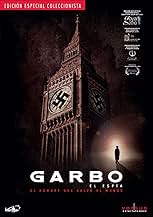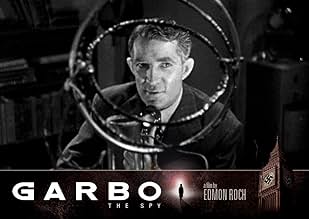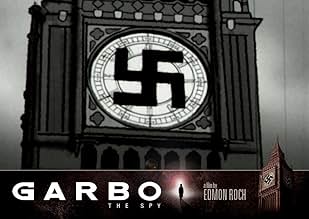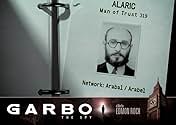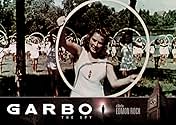A compelling account of Juan Pujol, an extraordinary Spanish double agent during WWII who helped change the course of history.A compelling account of Juan Pujol, an extraordinary Spanish double agent during WWII who helped change the course of history.A compelling account of Juan Pujol, an extraordinary Spanish double agent during WWII who helped change the course of history.
- Director
- Writers
- Stars
- Awards
- 4 wins & 3 nominations total
- Director
- Writers
- All cast & crew
- Production, box office & more at IMDbPro
Featured reviews
This was a disappointing film for me to watch. I had viewed other films about Garbo that I enjoyed more. It started out as a 1940s newsreel so that fooled me and my wife if this was a film or newsreel history or what. Then they rattle off a bunch of partial clips of 2 or 3 interviews with people only saying much later who they are. Nigel West appears and sheds light on how he found Garbo after the war. The WW2 cartoons of Private Snafu with the German spy woman are pretty cheap to get off the public domain and repetitive to watch. Why American cartoons? No German cartoons of English spy woman footage around? I liked how they talked about how stupid the German's were from a rational sense, believing many superstitious things, feuling Garbo's imagination to make agents. They do joke about an English sense of humor (and lack of German humor) that may offer deep insight on why Garbo was so successful so I will credit it for that, 6 of 10 stars. I would recommend watching this as a supplementary film to the other productions about Garbo, they are more coherent and entertaining.
I'm on a roll this week watching bad docs with subjects that should have made them much more interesting. I'm still trying to figure this one out. Obviously the interviewees think this is an amazing story, but the viewer is left wondering why—the doc takes this amazing story and tries to tell it using old movie clips whose only connection is that they were about WWII. I didn't like the fact that we are not introduced to these interviewees until midway through the film, that there are long pauses of silence (where it seems narration should have been placed but wasn't) and the music was disconcerting (to be diplomatic... to be rude, it was awful). I could see how this story would make a great Hollywood movie, but the way it was presented here, I had a hard time believing any of it was true.
This documentary deserves to be remade by professionals. Characters speak in different languages with no translation. People come and go with no segways. it has potential.
I see my friend Nigel West in the credits. perhaps he can shed some light.
This story is one of the more memorable footnotes to World War II - the tale of Joan Pujol Garcia, a man who ends up being a double-agent during a pivotal moment in history. And his appearance on the world stage couldn't be more important: his counterintelligence was designed to undermine the D-Day invasion.
It's obviously not a big-budget documentary, but uses a variety of talkies and newsreel footage to round out the story. The cast of interviewees is relatively small; and the inclusion of inappropriate (or confusing) sound effects and garbled film editing makes for a less than compelling story. The story itself was the most memorable segment in Ben Macintre's Operation Zigzag, and the film's running length of 88 minutes suggests that the filmmaker had run out of material. If only he'd read Macintire's book first.
It's obviously not a big-budget documentary, but uses a variety of talkies and newsreel footage to round out the story. The cast of interviewees is relatively small; and the inclusion of inappropriate (or confusing) sound effects and garbled film editing makes for a less than compelling story. The story itself was the most memorable segment in Ben Macintre's Operation Zigzag, and the film's running length of 88 minutes suggests that the filmmaker had run out of material. If only he'd read Macintire's book first.
"Garbo, The Spy" is the story of Juan Pujol Garcia, probably the most successful double agent in World War II. Garcia's job with British intelligence was to earn Germany's trust and feed their military all kinds of incorrect information. This included his insistence that D-Day would take place in the Pas des Calais rather than Normandy.
Garbo had a network of subagents, all fake people. Before going to London, he told the Germans that he was there - he was really in Lisbon, getting information from the library to send them.
The deception of Pas des Calais/Normandy was remarkable and is beautifully covered in a documentary called Ghost Army, which tells the story of fake units with fake tanks and fake radio calls that were set up to throw off the Germans.
"Garbo, The Spy," as you perhaps discern from the other posts, is somewhat unusual in its format. Personally I liked it. They used movies, real footage, cartoons, and interviews to tell Pujol's story.
Possibly the closest to Garcia's story was the Alec Guinness film, "Our Man in Havana," from which several scenes were shown. Classic film buffs will also recognize Leslie Howard, Margaret Lindsay, and others.
Interestingly, Germany bought everything this guy was peddling and gave him the Iron Cross, and he was also brought to Buckingham Palace and given the Medal of Honor.
I say don't miss this, and the documentary footage of the Allies coming into Paris, the look on peoples' faces, and the liberated concentration camp survivors smiling and eating.
One person interviewed was Aline Griffith, the Countess de Romanones, who was an American model who became a spy in the OSS in Spain, eventually marrying Count Romanones. Her books - The Spy Wore Red, etc., make for fun reading.
Garbo had a network of subagents, all fake people. Before going to London, he told the Germans that he was there - he was really in Lisbon, getting information from the library to send them.
The deception of Pas des Calais/Normandy was remarkable and is beautifully covered in a documentary called Ghost Army, which tells the story of fake units with fake tanks and fake radio calls that were set up to throw off the Germans.
"Garbo, The Spy," as you perhaps discern from the other posts, is somewhat unusual in its format. Personally I liked it. They used movies, real footage, cartoons, and interviews to tell Pujol's story.
Possibly the closest to Garcia's story was the Alec Guinness film, "Our Man in Havana," from which several scenes were shown. Classic film buffs will also recognize Leslie Howard, Margaret Lindsay, and others.
Interestingly, Germany bought everything this guy was peddling and gave him the Iron Cross, and he was also brought to Buckingham Palace and given the Medal of Honor.
I say don't miss this, and the documentary footage of the Allies coming into Paris, the look on peoples' faces, and the liberated concentration camp survivors smiling and eating.
One person interviewed was Aline Griffith, the Countess de Romanones, who was an American model who became a spy in the OSS in Spain, eventually marrying Count Romanones. Her books - The Spy Wore Red, etc., make for fun reading.
Did you know
- TriviaAs the credits roll (after showing the names of those who appeared on film), additional information are revealed. Winston Churchill's quote of "In wartime, truth is so precious that she should always be attended by a bodyguard of lies" "To Annia" As he worked for the MI5, Pujol's telephone was tapped and his private correspondence underwent censorship. He was never left alone. He could only use invisible ink under the supervision of a member of the Secret service. He never met any other agent, entered the MI5 premises, or knew his position in the Organization. He never tried to find out more, or ever complained. After the War, MI5 wanted Pujol to spy on Russia. For unknown reasons, he did not accept. He spent all his fortune on land in Venezuela. In 1948, his property was assaulted and destroyed. He sold it at a quarter of the value. Juan Pujol managed to fight two wars serving both sides. Never fired a single shot. His vivid imagination produced over 50 volumes of writings. Thus he spared thousands of lives. On both sides.
- How long is Garbo: The Spy?Powered by Alexa
Details
- Release date
- Country of origin
- Official site
- Languages
- Also known as
- Garbo: The Spy
- Filming locations
- Barcelona, Catalonia, Spain(Studio)
- Production companies
- See more company credits at IMDbPro
Box office
- Gross US & Canada
- $28,563
- Opening weekend US & Canada
- $5,593
- Nov 20, 2011
- Gross worldwide
- $356,050
- Runtime
- 1h 28m(88 min)
- Sound mix
- Aspect ratio
- 1.85 : 1
Contribute to this page
Suggest an edit or add missing content


